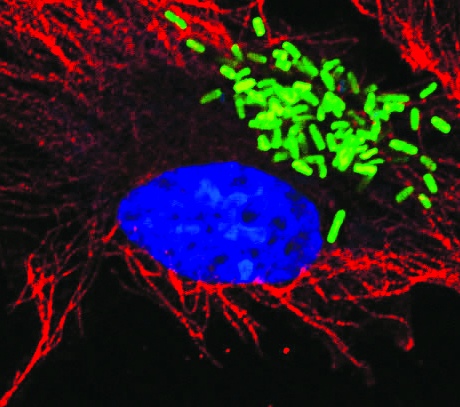Queen creates new Regius chair at Imperial
by Kate Wighton

Imperial has been awarded a prestigious Regius Professorship, recognising the highest standard of research and teaching in the Faculty of Medicine.
Imperial will confer the title on Professor David Holden, from the College’s Department of Medicine. Professor Holden is one of the world’s leading experts on Salmonella bacteria, which cause diseases including gastroenteritis and typhoid fever.
The Regius Professorship in infectious disease is a tribute to our academics and their world-leading research
– Professor Alice Gast
President
Announced on 6 June, the honour was granted by the Queen as part of her 90th birthday celebrations. This second Regius professorship for Imperial is one of only 26 to have been granted since the reign of Queen Victoria, including 12 to mark Her Majesty’s Diamond Jubilee. Eleven other institutions were awarded professorships in today's announcement, including the Institute of Cancer Research, London.
The title recognises the work of Imperial's Faculty of Medicine in infectious diseases. The faculty hosts the largest concentration of infection-related research in Europe, and covers a broad spectrum of infection research activities from fundamental science, through to engineering, clinical trials and healthcare economics.
The College also hosts the Antimicrobial Research Collaboration, which consolidates world leading, multidisciplinary research at Imperial to tackle the global threat of antimicrobial resistance.
Professor Holden is distinguished for outstanding contributions to the knowledge of molecular mechanisms of pathogens such as Salmonella, and how they infect humans. In 1995 he invented a powerful genetic screening technique called signature-tagged mutagenesis or ‘DNA barcoding'. This has had a huge impact on the understanding of many biological processes in both microbes and human cells, and has aided the design of vaccines against bacterial pathogens. Several patents on the technique have been granted, and it was a foundation for the formation of Microscience, a UK vaccine company.
Professor Holden subsequently made important breakthroughs in understanding how Salmonella causes diseases such as typhoid fever. More recently his group developed techniques for analysis of bacteria at the single cell level. This led to the discovery of antibiotic-tolerant persister cells of Salmonella, likely to be an important cause of relapsing infection in patients. Professor Holden and his colleagues are at the forefront of Imperial's efforts to tackle bacterial persistence and antimicrobial resistance.

Salmonella bacteria (green) replicating inside an epithelial cell
Professor Alice Gast, President of Imperial College London, said: “Ever since Sir Alexander Fleming discovered penicillin here, Imperial has conducted ground-breaking research into infectious disease that has changed the lives of people across the globe. Today our engineers, epidemiologists, microbiologists and clinicians are working together to understand and fight antimicrobial resistance. The Regius Professorship in infectious disease is a tribute to our academics and their world-leading research. We are proud that someone of David Holden's stature will be recognised as a Regius Professor for his ground-breaking work on Salmonella, and reducing the impact of deadly pathogens on human lives.”
Professor Gavin Screaton, Dean of the Faculty of Medicine at Imperial, added: “This award recognises the world renowned excellence of our work on infectious diseases, which Professor Holden exemplifies. On behalf of the Faculty, I’d like to say that we are extremely honoured to be recognised in this way and we thank HM The Queen for the award.”
Jo Johnson, Minister for Universities and Science, said: “The success of our economy is underpinned by the exceptional science and research taking place in our world-leading universities up and down the country, and I’m delighted these 12 institutions have been recognised for their achievements. We’ll continue to make sure pioneering science is recognised and supported to help improve the lives of millions across the country and beyond.”
Article text (excluding photos or graphics) © Imperial College London.
Photos and graphics subject to third party copyright used with permission or © Imperial College London.
Reporter
Kate Wighton
Communications Division